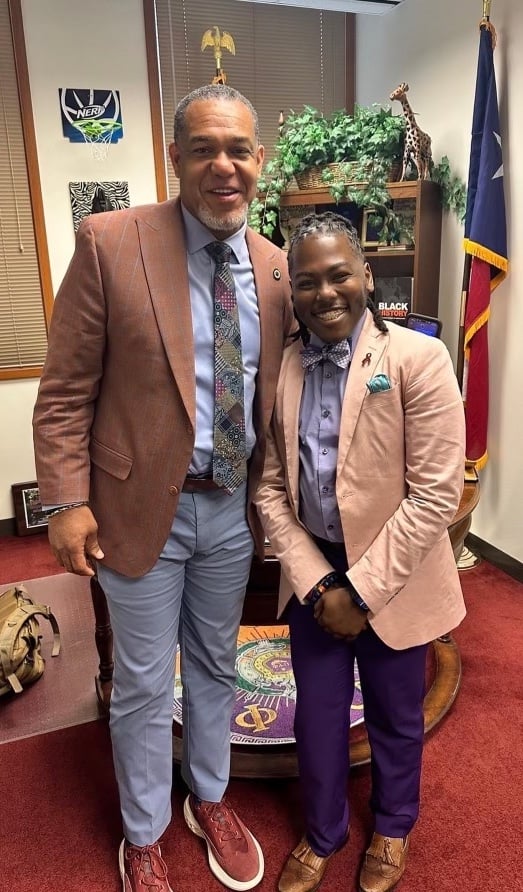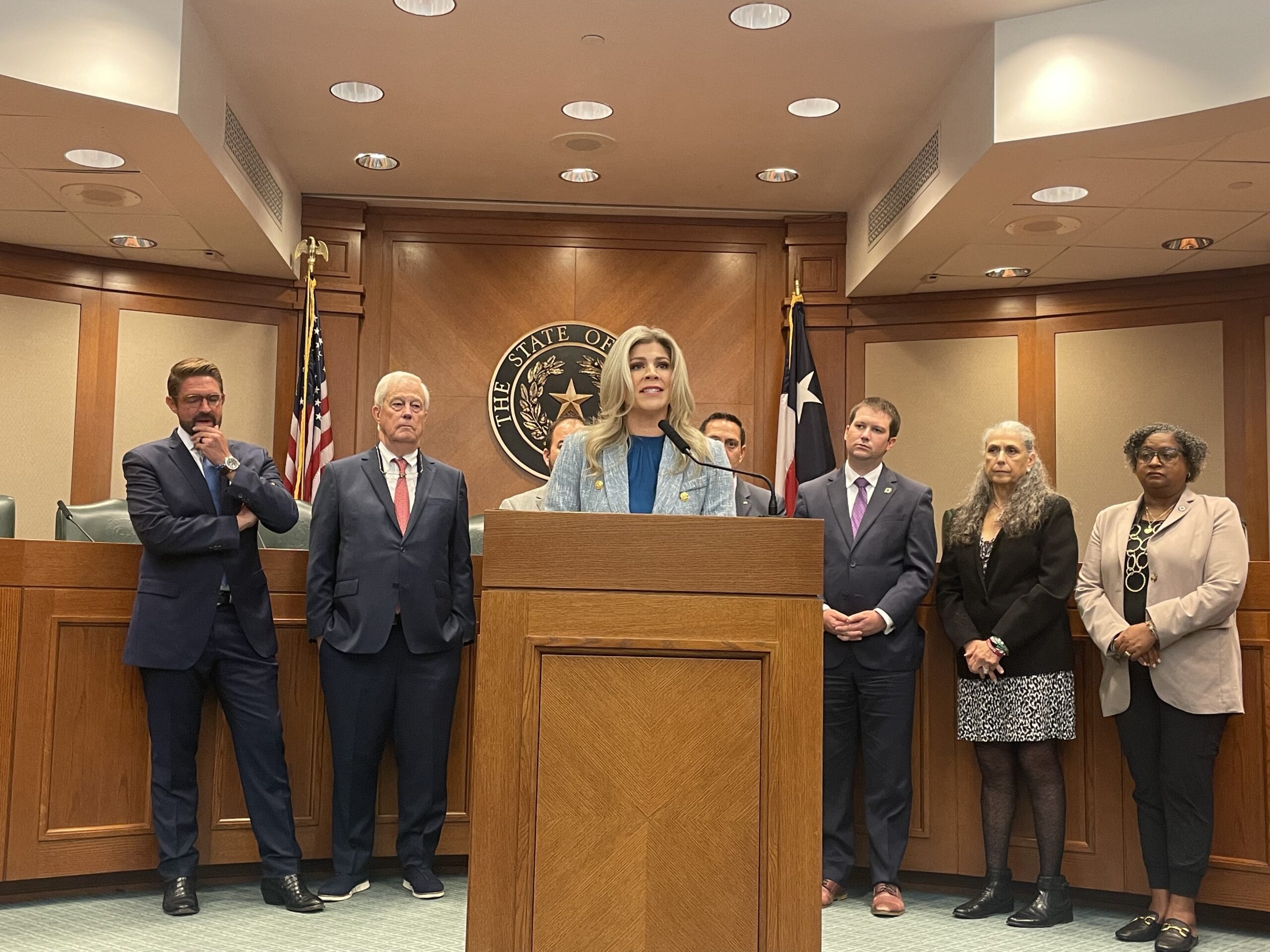
Abbott Torpedoes Sickle-Cell Legislation on Juneteenth Weekend
Democratic State Representative Jarvis Johnson called the governor's veto "petty, bullshit politics."

When André Harris Marcel arrived at the emergency room last July, he wasn’t sure if he would make it out alive. Marcel, a 34-year-old Houston resident who is pursuing a doctorate in social work at the University of Houston, lives with sickle cell disease and is a longtime advocate for sickle cell patients.
Those living with the rare, hereditary disease have rigid, crescent-shaped red blood cells. Due to their curved shape, these cells can become stuck in small blood vessels, blocking the flow of blood and causing stroke, infection, and extreme pain—conditions known as a sickle cell crisis. There is currently no cure for sickle cell disease, only techniques for managing symptoms.

Last summer, Marcel experienced such a crisis: He woke up with a fever that didn’t break after taking Tylenol and was experiencing pain so severe that he could barely move or speak. He knew he needed to head to the emergency room—his fever might mean an infection, which for those living with sickle cell disease could be fatal.
But when he arrived at the hospital, Marcel said, the emergency room staff failed to respond to his situation with the urgency it deserved. It took 28 hours for him to get admitted and receive the pain management care he needed.
This type of delay in care can be deadly, but Marcel said that for folks with sickle cell disease, it’s tragically common.
“You’re left to languish in the waiting room not knowing if you’re going to walk out alive,” he said. “No one is paying attention. Nobody’s coming to check on you.”
Although a person of any race or ethnicity can have sickle cell disease, the hereditary condition disproportionately affects Black Americans, who make up approximately two-thirds of the estimated 100,000 people in the United States with the rare condition.
Advocates say that Black Americans with sickle cell disease often experience discrimination in emergency rooms. A sickle cell crisis requires a high dosage of pain medication, but doctors unfamiliar with disease can be hesitant to prescribe needed opioids, and patients are often mischaracterized as being drug-seeking.
“Because of the racialization of the disease, there’s a lot of discrimination that happens … in emergency departments,” Marcel said. “A lot of providers deny people with sickle cell pain medication, and their justification is ‘I don’t want you to get addicted or abuse it.’”
In comparison to other rare diseases, sickle cell anemia is understudied and research on it is underfunded. That’s one reason doctors are less familiar with the disease and less prepared to treat patients.
Advocates say one reason for this lack of research dollars is that doctors and public health officials still don’t have a clear sense of how many people are affected by the disease. Experts estimate that at least 7,000 Texans live with sickle cell, but they stress that the number is likely an undercount.
For years, public health officials have been campaigning for improved data tracking to give a clearer picture of sickle cell disease in the state. This legislative session, advocates celebrated the passage of House Bill 181, which would have established a sickle cell patient registry.
However, celebrations over the registry were cut short last week, when Governor Greg Abbott announced he had vetoed the bill. Supporters of the bill were quick to point out the irony of Abbott’s timing: The announcement came over Juneteenth weekend, just a few days before World Sickle Day.
Supporters say they were shocked and disappointed at the unexpected veto of what they characterized as low-cost, commonsense legislation that would have improved the lives of thousands of Texans. The veto was especially shocking because establishing a registry responded to specific recommendations of the state-led Sickle Cell Task Force.
The bill’s author, state Representative Jarvis Johnson, D-Houston, accused Abbott of playing “petty, bullshit politics” with the veto, using it to get back at legislators who had failed to support some part of the governor’s agenda. He said no one from the governor’s office had called to warn of the veto or to express concerns about the privacy of health records, which Abbott had given as his reason for the veto.
The bill received broad bipartisan support, as well as the backing of the state’s medical community. At the bill’s hearing before the Texas House Committee on Public Health, representatives from the Texas Association of Health Plans, the Texas Pediatric Society, the Texas Chapter of American College of Physicians, and the Texas Medical Association registered support for the bill. No one testified against the bill in either the House or Senate committee.
Dr. Titilope Fasipe, a pediatric hematologist in Houston who works with sickle cell patients, said a registry would have given doctors and public health officials a more accurate picture of the population of Texans living with sickle cell. Better data can help raise awareness around the rare disease and ultimately improve the treatment patients receive.
“You’re trying to capture where you need to invest in more resources,” Fasipe said, “and this is especially important for a disease like sickle cell disease because it’s been historically neglected.”
“No one came to us to say, ‘Hey, we’re a little concerned about this.’ No one would have suspected that the governor would take this route.”
In his veto proclamation, Abbott wrote that the bill would “force hospitals to share reams of sensitive health information with a sickle cell disease registry, putting the privacy of patients at risk.”
But Johnson said that characterization is far from the truth. “I call bullshit on that,” he said. “I don’t know where he got his intel from.”
The Houston legislator said there were “no questions, no calls” from the governor’s office. “No one came to us to say, ‘Hey, we’re a little concerned about this.’ … No one would have suspected that the governor would take this route.”
“It’s funny because the people who are afflicted with sickle cell don’t have any complaints. They are the ones saying, ‘Yes, share my information, I want this information out,” Johnson said. “The problem has been that this country hasn’t placed enough emphasis on the disease because we don’t actually know how many people are afflicted, and as a result the pharmaceutical companies and the medical community don’t put a lot of emphasis into it.”
It was absurd to suggest that the creation of the registry would compromise patient privacy when the state already operates similar registries for other diseases, including cancer.
“You’re showing your horns now. You’re showing your tail now. You’re showing who you really are, Governor,” Johnson said. “You don’t care about people that much, because if you did care that much you would understand confidentiality is the least of the worries of people who are afflicted.” A spokesperson for the governor’s office did not immediately respond to a request for comment.
Marcel said he’s proud of the efforts of advocates during this year’s regular legislative session and that the passage of House Bill 1488, a bill that aims to improve sickle cell education for healthcare providers and public school teachers, is a positive step. But he’s still fuming over the veto.
“It’s very frustrating when people do not value the humanity of someone with sickle cell,” he said.



